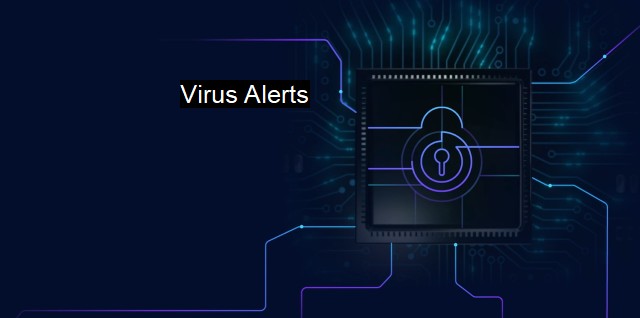What are Virus Alerts?
Staying Ahead of the Game: The Importance of Antivirus Technology and Virus Alerts in Modern Cybersecurity
"Virus Alerts" in the context of cybersecurity and antivirus can be understood as notifications or warnings that a user receives from their antivirus software about a potential malicious activity or threat detected on their device, channelized through an infected document or software. These alerts serve as an important security layer, proactively informing the user to take action and protect any valuable information from being stolen or any hardware from getting damaged.Antivirus software functions by constantly monitoring your system and scanning any file, application, or web-page you open in the background. This process is known as real-time scanning, and it helps in instantly identifying any malicious entity. The moment the antivirus identifies any kind of threat, be it virus, malware, ransomware, spyware, trojan, or any others, it instantly sends a "Virus Alert".
These alerts provide detailed information about the type of virus detected, the severity, and more importantly, the file that is infected. This information directs users about the steps to take next — whether it's quarantining the file, deleting it, or following some rigorous steps to remove the severe threat.
Antivirus software features various alert levels. They are as follows:
1. Informational: It engages the user when the antivirus system has something to communicate but it doesn't essentially indicate a threat. This might include software updates, subscription information, or system scanning updates.
2. Warning: A warning alert is relatively more serious. If a user receives this kind of alert, there is a potential minor threat that must be attended to.
3. Critical: This alert suggests that there is a considerable threat that desperately needs the user's attention. If not handled promptly, the issue might obstruct the system or cause other critical complications.
Despite the immediate consequence automated in antivirus software to quarantine or delete the potential threat, "Virus Alerts" are substantial as they instigate immediate action from the user and educate about the kind of threats prevailing which will strengthen their understanding about cybersecurity.
Virus Alerts are many a time provided through emails or messages conveyed by the antivirus software experts. These may inform users about new threats or viruses and give instructions on what precautions to be taken. The aim is to raise consciousness and bring out regular updating of the antivirus software.
Antivirus maintains up-to-date dictionaries of known viruses, ensuring that effective detection is implemented, even after variations in the new kinds of computer viruses appear regularly. Therefore, regular updates are critical for real-time protection.
"Virus Alerts" have a significant role in the entire ecosystem of cybersecurity. They act as the first line of defense in protecting hardware or soft data from unauthorized access. Alerts maintain user involvement in preserving their system's health and building a safeguard mechanism against cyber exploits. With the continued escalation of complex cybersecurity threats, the importance of timely and accurate "Virus Alerts" cannot be overstated. They form an integral aspect of cybersecurity infrastructures, catering to the volatile paradigm shifts in the technological schema, and the transition towards a more digitized world, where a considerable magnitude of our personal and professional life is stored virtually.

Virus Alerts FAQs
What is a virus alert?
A virus alert is a notification that is issued by antivirus software or cybersecurity systems when potential threats of malware or viruses are detected on a computer system.Why is it important to pay attention to virus alerts?
It is essential to pay attention to virus alerts because they indicate that cybersecurity threats are present on your system. Ignoring or dismissing these alerts can result in severe damage to your computer system, including data loss, identity theft, or financial loss.What actions should you take when a virus alert pops up?
When a virus alert appears on your computer, it is best to immediately run a full system scan and follow the recommended actions provided by the antivirus software. This may include isolating or removing infected files, updating software, or contacting technical support.How can I prevent virus alerts from appearing on my computer?
To prevent virus alerts from appearing on your computer, ensure that you have a robust and updated antivirus program installed on your system. Avoid downloading or opening unsolicited emails or attachments, and do not click on suspicious links or pop-ups. Regularly back up your data and keep your operating system, software, and web browsers up to date with the latest security patches.| | A | | | B | | | C | | | D | | | E | | | F | | | G | | | H | | | I | | | J | | | K | | | L | | | M | |
| | N | | | O | | | P | | | Q | | | R | | | S | | | T | | | U | | | V | | | W | | | X | | | Y | | | Z | |
| | 1 | | | 2 | | | 3 | | | 4 | | | 7 | | | 8 | | |||||||